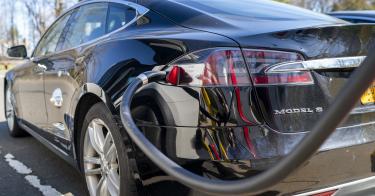“America is Back in the Factory Business” declared a recent Wall Street Journal headline.
On its face, this should be good news. Investments in expanding manufacturing capacity are a sure sign of a strong economy. Moreover, bringing more manufacturing back to the United States is a good way to mitigate the risks to America’s global supply chains that COVID-19 exposed—or more accurately, the risks exposed by governments’ response to COVID-19.
But not so fast.
A closer look at the economy tells us that something very different is afoot. This industrial expansion is not the result of strong economic fundamentals but rather is a response to the Biden administration’s massive taxpayer-funded subsidies for so-called green energy. In other words, American companies are not investing capital because they are optimistic about the economy or because they see consumer demand for certain products increasing but because the government is paying them with taxpayer money to do so.
Like so much of the Biden agenda, this so-called manufacturing boom is full of hot air.
And it is about to get worse.
For example, the United States Environmental Protection Agency just announced its intention to impose draconian rules on American consumers, forcing nearly two-thirds of passenger cars, trucks, and SUVs purchased to be electric by 2032.
Why is the EPA pushing this agenda? According to the proposal, it is to “accelerate the ongoing transition to a clean vehicle future” and to “tackle the climate crisis.”
This is absolute nonsense. Even according to the EPA, the quantity of nearly every tracked air pollutant has dropped dramatically since 1990, and according to the models used by the United Nations, the U.S. could reduce carbon dioxide emissions to zero, and it would have virtually no impact on this alleged “climate crisis.”
But putting aside the EPA’s bogus justification and its authoritarian nature, the proposed electric vehicle rule is about to take President Joe Biden’s manufactured manufacturing bubble and put it on steroids.
This is why.
Companies respond to market signals. The reason that economies organized around free enterprise are generally stronger and more resilient than those managed by politicians and bureaucrats is because the market signals in a free economy are delivered by the preferences of people acting of their free will in their own interest. Companies produce products and services that people want. People buy them. And investors invest in developing the production and labor required to fulfill market demand.
Though consumer preferences can be fickle, generally speaking, they follow what is useful and affordable; and, thus, those preferences provide the foundation on which an economy can flourish that meets the most needs of the most people.
Competition within the system forces companies to be innovative, lest they be overtaken by new companies that apply new technologies or better business practices. The system also invites dynamism as entrepreneurs pursue new opportunities that could open future demand.
When companies invest wisely, they profit, and Americans get access to new and improved products. When an idea fails, the resources used to support that product can be reallocated to other endeavors.
While this system may not be perfect, it works. That is until politicians and bureaucrats, full of hubris, decide that they can manage the economy better than 331 million Americans.
Whether through rhetoric, regulation, mandates, or subsidies, Washington’s “wannabe” businesspeople have a well-stocked quiver with which to impose their agenda on us all. And when they do, industry often follows.
Consider Biden’s “guarantee” to put gas and oil companies out of business. The results are completely predictable. Gas and oil companies understandably became hesitant to invest the massive amounts of capital required to increase production and refining. As demand rose, supply was constrained, and prices rose as a result.
As the aforementioned Wall Street Journal article reported, the opposite is also true, with growing amounts of investment going toward initiatives that the government is promoting through efforts like the massive Inflation Reduction Act. Today’s manufacturing boom features electric vehicles, batteries, and components for the wind and solar industries.
But here is the problem: People don’t want to purchase these products. If they did, then the government wouldn’t need to compel us to use them. Building an industry on political dictate rather than consumer-driven market demand creates a house of cards, at best. Once the taxpayer support for those industries goes away, so does the economic rationale for their existence. We are then stuck with an industry reliant on taxpayer support for its survival rather than on providing goods and services that people want.
These subsidies not only become a costly drag on federal budgets but also misallocate scarce economic resources to low-value activities that the government values but consumers don’t. This starves good ideas of the capital that would otherwise be available to move them forward. It also creates a massive economic drain as Americans are forced to pay higher prices for inferior products while simultaneously being denied access to the things that those resources could have produced.
Eventually, all these costs add up to unsustainable levels, and when the taxpayer largesse goes away, the industry that depended on it will crumble (and probably ask the government for a bailout).
Now, Biden’s EPA is trying to foist electric vehicles on drivers. But EVs don’t make the grade in the American automobile market. Some of the earliest cars in the U.S. were battery-powered, but they lost out in open competition to gasoline-powered vehicles.
Despite years of subsidies and other special treatment for both consumers and manufacturers of modern EVs, only 4% of American drivers own an EV and only 12% are even interested in buying one.
And therein lies the problem.
If the EPA and Biden are successful from a regulatory standpoint, industry will follow. Massive investments will be made to support the policy, and politicians will all claim victory. But then reality will set in, as it always does, because these investments had nothing to do with what the people wanted but everything to do with what the politicians, bureaucrats, and special interests demanded.
Any industry built on such vacuous pillars will always fail. It’s just a matter of when. And it will be ugly.
Orders for new EVs will lag. This will expose the real economics underpinning the industry. That’s when the factories start to shutter and jobs will be lost. We will see some initial bailouts. Then the entire thing will crumble.
The politicians and bureaucrats who made these decisions may be long gone by then, but American taxpayers and drivers will be left paying the bills.
This piece originally appeared in The Daily Signal




